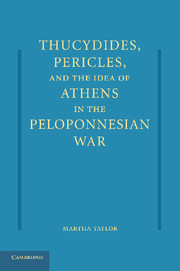5 - The City on Samos
Published online by Cambridge University Press: 27 January 2010
Summary
THE CITY IN ATHENS WAS QUIET
We saw in the previous chapter that the Four Hundred had a relatively easy time turning Athens to oligarchy, notwithstanding Thucydides' explicit comment to the contrary. As Thucydides continues his narrative to cover the fall of the oligarchy, he shows that the real difficulty that the Four Hundred faced in ending the liberty of the Athenian people came first from the Samians, then from the Athenians on Samos, and only late from the men in Athens. The effect is to reinforce the impression that the Athenians (and especially the Attic Athenians) do not really care about democracy. Moreover, when the Samian Athenians finally do focus on democracy, they consider abandoning the Athens in Attica altogether as they constitute themselves a (democratic) city on Samos. Although many commentators find the men on Samos sympathetic, Thucydides' presentation of them is far from favorable. Thucydides focuses on the destructiveness of their factioneers' zeal and on the danger of a portion of the city insisting that it alone is qualified to judge what the city should be. His narrative underscores the benefits of political compromise and implies that compromise and reconciliation are only possible for Athens around the image of the traditional city in Attica.
The Four Hundred had very little to fear from the men in Athens, as Thucydides' description of the council's meek withdrawal “saying nothing in opposition” (οὐδὲν ἀντειποῦσα, 8.70.1) demonstrates.
- Type
- Chapter
- Information
- Publisher: Cambridge University PressPrint publication year: 2009

